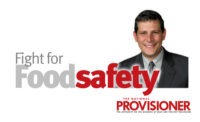The Ranchers-Cattlemen Action Legal Fund, United Stockgrowers of America (R-CALF) is seeking to reinstate country-of-origin labeling (COOL) requirements in beef products. To that end, they have raised $50,000 and embarked on a campaign, the Label Our Beef campaign. They hope to convince President Donald Trump to sign an executive order reinstating mandatory COOL labeling for beef products.
Mike Schultz, chairman of R-CALF’s COOL Committee, says American farmers and ranchers are suffering because of COOL’s 2015 repeal. “Three simple words, ‘Product of USA,’ is the new metaphorical cash cow,” Schultz says. “When the COOL law was fully implemented from 2013 to 2015, American farmers and ranchers received $325 per calf more compared to the next two years when meatpackers were no longer required by law to label beef with its country-of-origin.” R-CALF recently delivered a petition to the president, signed by more than 30,000 people, requesting reinstatement of COOL.
The campaign is part of a larger battle between a diverse array of companies, consumer groups, governmental entities, and even the World Trade Organization. Some of the largest U.S. meat producers — including Tyson, Hormel and Smithfield Foods — are vociferously opposed to COOL, arguing that COOL’s labeling requirements would result in higher costs to both producers and consumers. Likewise, the World Trade Organization is opposed to the law, ruling in 2015 that COOL is a discriminatory practice that harms the livestock industries in Canada and Mexico. The WTO ruling, which subjected the U.S. to retaliatory tariffs, led Congress to repeal COOL in 2015.
Consumers, on the other hand, appear to be heavily in favor of COOL laws. According to a 2016 Consumer Reports Food Labels Survey, 87 percent of adults said they wanted country-of-origin labels on meat, poultry, fish and produce, and 93 percent wanted to know whether the meat they purchase was of U.S. origin.
There are compelling arguments favoring each side, and certainly there are many additional considerations from the context of U.S. trade as a whole.
Global trade rules are extraordinarily complex, and it is difficult to know whether there is a “right” answer here. To date, there has been no indication President Trump will act on the petition to reinstate COOL requirements. NP





Report Abusive Comment